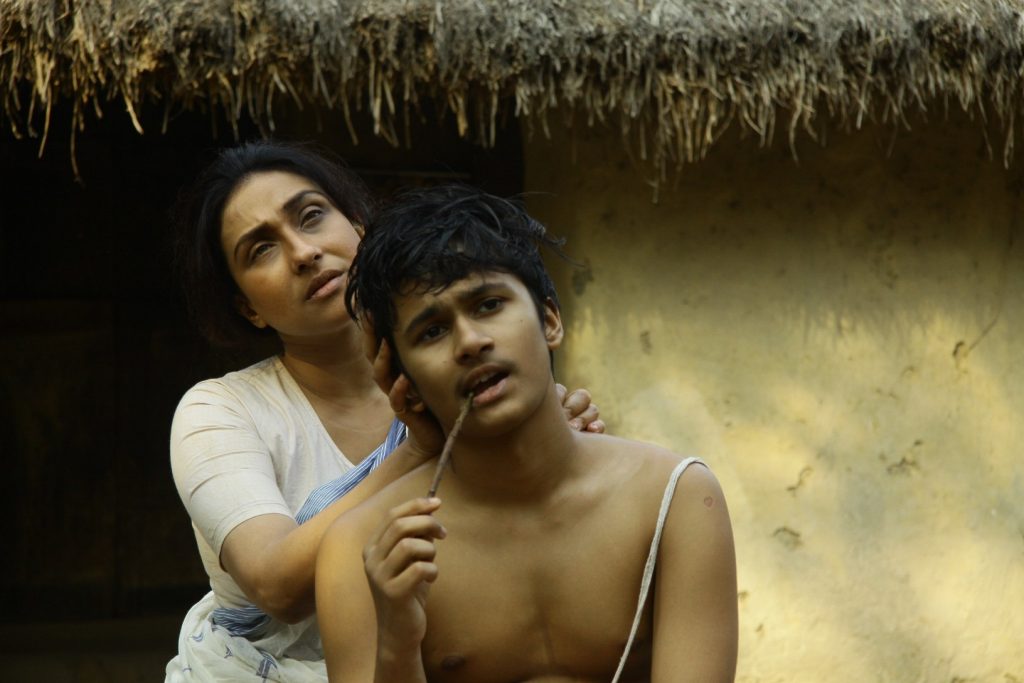Rong Beronger Korhi is basically about four different stories where each story deals with human relationships and money. Is money a concept? Is it an ideology? Is it an illusion, a fantasy or a cruel reality in different forms?
The four stories in Rong Beronger Korhi are attached to the four seasons beginning with Holi. They are threaded together with an omnipresent female voice-over (Anasuya Majumdar) who represents ‘earth’ and narrates a funny rhyme that explains the message of the film. This is an original beginning but its significance begins to fade when it is repeated too often.
The director, Ranjan Ghosh, uses the names of colors for each story – red for the first, blue for the second, golden for the prostitute episode and white for the mother-son story. He has tried to blend several things in the same film – seasons, festivals, places, time of day/night, a couple of actors (Rituparna Sengupta, Arunima Ghosh) doing different roles, the rich and the poor, the widow, the wife and the prostitute, and even the mainstream and the marginalised. Sometimes, this works and sometimes, it confuses. But it is a very innovative and courageous effort.
In the first story, a Dalit pair (Soham Chakraborty and Arunima Ghosh) arrive on a bullock cart at the village Panchayat office seeking the lawyer’s help. They want a divorce. The lawyer is absent and the person present offers to help out and write out a divorce certificate in exchange for Rs 500. This segment is dealt with a feather-light touch with some humor and satire though the story is quite serious. The couple, Ram and Sita Murmu, speak in a Santhali dialect of Birbhum district and the spontaneity of their performance is outstanding. Children playing Holi in the background as the lazy and obese Panchayat office clerk listens to music on his very temperamental transistor adds to the fun without being loud.
The second story is set in a different village and deals with love born of an unequal marriage between an elderly and affluent man and a very poor and young girl from a neighboring village. Does their newfound love sustain or does it die a sudden death? The establishing shots of preparations for Lakshmi Pooja against images of the young wife decking herself up in front of the mirror against the strains of a beautiful Tagore song that sets the changing moods define a touching story that stays with you till the third story unravels on screen.
The scene now shifts to the onset of winter in Kolkata with a voice-over that informs the hero (Ritwik Chakraborty) that he is being sacked because he could not fulfill his sales targets for months together. In a strangely silent scene, his girlfriend quietly places a ring in his palm, mouths “take care” silently and moves on. The deeply frustrated hero, his pockets filled with his last salary lands up in a brothel where the lady shares the room for economy with a very old couple who step out of the room when a ‘party’ steps in. This is probably Rituparna Sengupta’s finest performance in recent times aided and enhanced by the constant play of light-and-darkness on her face as she talks to this man, who is still a virgin. Technically and in terms of aesthetics, this may be said to be the best among the four segments. The two characters are not given any names and that adds to the intrigue.
The fourth and last segment is set in a village with the Durga Pooja round the corner. One can hear the strains of the Mahalaya being played on the radio. Jaga, a young boy, who has inherited his late father’s passion for playing drums, is planning to take part in a drum-playing contest during Durga Pooja in Kolkata, some distance away. But his mother (Rituparna Sengupta) is very sick and even as he plays in the city, the idol of the Goddess reminds him of his mother and he puts down his drum to walk out and ask after his mother on his cell phone. He wins the contest but it means nothing to him anymore. The splendid performance of Ritobroto Mukherjee as the young son lifts this story to a new height though its predictability and structured melodrama brings it down a few notches.
Debajyoti Misra’s music is in keeping with the changing scenarios of each story, investing the stories with the rhythm and the mood they demand, individually and together. Shirsa Ray’s camera, specially the way he plays with different kinds of lighting at different times adds to the film’s mystery and mystique. Rabiranjan Maitra’s editing however, often falls back on the cliché strategy of capturing clouds passing across a full moon or just the full moon with similar sweeps between stories and scenes. Tanmoy Chakraborty’s art direction is improving from one film to the next and in this one, he has pushed the borders of his own detailing history, competing with himself.
The lesson I came out of the theatre with is – money per se has no meaning unless it carries with it the emotional resonances of love, or belonging, of a sense of rooted ness without which, Life is a meaningless stasis, a void where living or dying makes no difference. Rong Beronger Korhi is a very well-made film minus a few hiccups which, fortunately, much of the audience will not hear.
Bengali, Drama, Color


